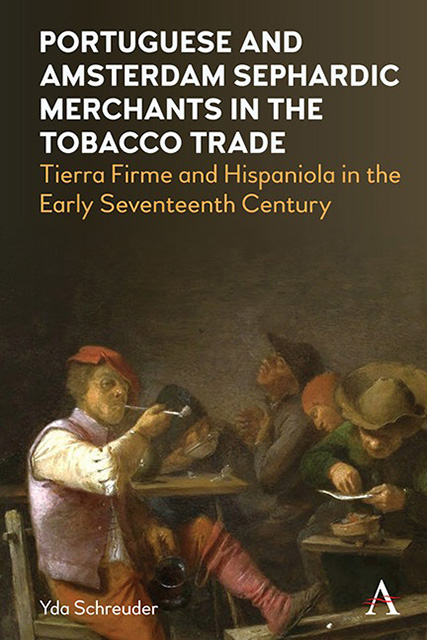 Portuguese and Amsterdam Sephardic Merchants in the Tobacco Trade
Portuguese and Amsterdam Sephardic Merchants in the Tobacco Trade Book contents
- Frontmatter
- Contents
- List of Figures
- Preface
- Chapter 1 Portuguese and Amsterdam Sephardic Merchants in The Tobacco Trade in The Early Seventeenth Century
- Chapter 2 The Contraband Tobacco Trade With Spanish America: Tierra Firme and Hispaniola
- Chapter 3 Portuguese Merchants and The Tobacco Trade With Tierra Firme
- Chapter 4 Portuguese Merchants and The Tobacco Trade With Hispaniola
- Chapter 5 Conclusion
- Bibliographic Notes
- Index
Chapter 5 - Conclusion
Published online by Cambridge University Press: 17 October 2023
- Frontmatter
- Contents
- List of Figures
- Preface
- Chapter 1 Portuguese and Amsterdam Sephardic Merchants in The Tobacco Trade in The Early Seventeenth Century
- Chapter 2 The Contraband Tobacco Trade With Spanish America: Tierra Firme and Hispaniola
- Chapter 3 Portuguese Merchants and The Tobacco Trade With Tierra Firme
- Chapter 4 Portuguese Merchants and The Tobacco Trade With Hispaniola
- Chapter 5 Conclusion
- Bibliographic Notes
- Index
Summary
Introduction
In the last section of his 1948 article “Dutch-Spanish Rivalry in the Caribbean,” Sluiter concludes that the policies implemented in 1606 by the Spanish Crown to inundate the Araya salt pans, to prohibit tobacco cultivation along the coast of Tierra Firme, and to depopulate coastal areas and relocate residents of Northwestern Hispaniola, were meant to chokeoff the smuggling going on in their territories. The documents analyzed in the previous two chapters illustrate the process by which this took place. In both Tierra Firme and on Hispaniola, Portuguese residents were key to the contraband trade with Dutch merchants who sailed along the coasts and up the rivers in Tierra Firme and along the shores of Hispaniola to drop anchor and to take tobacco on-board in exchange for cloth or woolen and silk goods, implements, and arms in high demand among coastal populations. From the documents presented we learn that among the crew on Dutch vessels were Portuguese merchants or pilots likely related to or linked in trade with Portuguese resident merchants on shore. In a Cedula issued by the Crown on October 28, 1606, the expulsion of all Dutch and Flemings was ordered in Tierra Firme and in the case of Hispaniola 10 merchants from the Dutch Republic were being rounded up. On November 10, 1607, the Council of the Indies recommended and the King approved that a branch of the Holy Office be erected in Hispaniola which suggests that the Portuguese were suspected of Judaizing. Sluiter (1948) does recognize that in the meantime the first negotiations for a truce between the Spanish and the Dutch had begun and that ports of the Iberian Peninsula would open again for Dutch trade to resume which would take away the incentive to haul salt or tobacco, pearls, and hides from the Caribbean. So, the stick and the carrot approach was applied, apparently, but it did not end the contraband tobacco trade.
In fact, the ban on tobacco cultivation and relocation of coastal populations encouraged tobacco smuggling and invited mariners and merchants to come on shore and bribe officials and both the Dutch and English mariners continued to trade, raid, or barter.
- Type
- Chapter
- Information
- Portuguese and Amsterdam Sephardic Merchants in the Tobacco TradeTierra Firme and Hispaniola in the Early Seventeenth Century, pp. 127 - 146Publisher: Anthem PressPrint publication year: 2023
